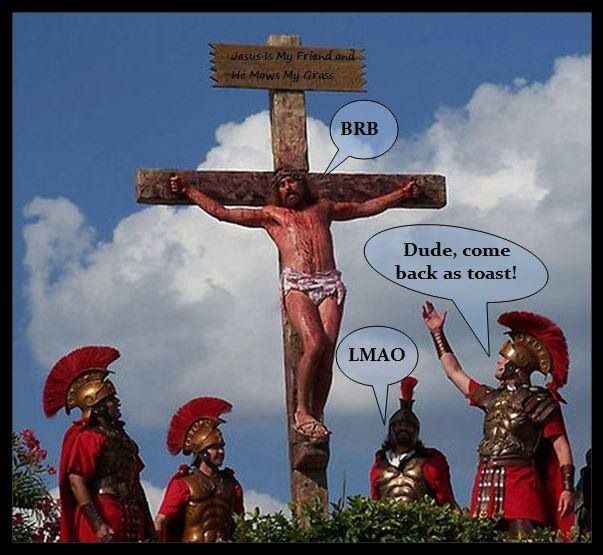The Apocalypse That Never Arrives: Fundamentalists and Their End-Times Obsession
From the Crucifixion to Congress, Fundamentalists Have Been Seeing the End of the World Everywhere

For two thousand years, Christians of the fundamentalist stripe have been predicting the end of the world with the same confidence that a child predicts Christmas morning. They have proclaimed wars, earthquakes, pandemics, and even presidential elections as proof positive that “the end is near.” And yet, every single one of them has had to keep waking up, brushing their teeth, and pretending they didn’t just announce the final trumpet call the night before.
It would be funny if it weren’t so consequential. Because while these apocalyptic predictions never pan out, they do shape how millions of people see their world, their neighbors, and their politics. When you’re convinced you’re living in the Last Days, everything looks like confirmation. And when you’re convinced you’re chosen to usher in God’s kingdom, you start seeing democracy as a speed bump on the road to theocracy.
Let’s take a walk through history, humor, and politics to see why fundamentalists never shut up about Armageddon, and why the rest of us should pay attention.
A Brief History of Failed End-Times Predictions
It’s not exactly news that Christians have been predicting the apocalypse since the very beginning. Jesus’ disciples themselves thought the kingdom of God would arrive in their lifetime (Matthew 24:34). When that didn’t happen, the excuses began — “the time isn’t quite right,” “prophecy is mysterious,” or “God’s ways aren’t our ways.” In other words: oops.
But that didn’t stop the cycle. Every war, every plague, every famine became another “sign of the times.”
- In 500 CE, church leaders like Hippolytus of Rome claimed the Second Coming was guaranteed. Spoiler: it wasn’t.
- During the Black Death in the 14th century, Europe thought the pestilence was God’s final judgment. It wasn’t.
- In 1844, the Millerites in America sold everything, dressed in white robes, and climbed onto rooftops waiting for Jesus. When nothing happened, it became known as The Great Disappointment. (Imagine explaining that hangover to your neighbors.)
- In 1970, Hal Lindsey’s bestseller The Late Great Planet Earth convinced evangelicals that Jesus would be back before the year 2000. Wrong again.
- And who could forget Harold Camping, who said the world would end in 2011? Twice. When the world kept spinning, he quietly retired from apocalypse-predicting.
The track record is laughably bad. But the fervor never dies. That’s because, for fundamentalists, it’s not really about accuracy — it’s about narrative.
Why They Need the End to Be Near
Fundamentalists don’t just believe in Jesus; they believe in a story that casts them as central characters in the cosmic drama. That story requires the world to be collapsing. Without the apocalypse, they’re just another religious group. With the apocalypse, they’re heroes in the final battle between good and evil.
This explains why every hurricane, election, or natural disaster gets spun into “fulfillment of prophecy.” The world has to be burning, otherwise their theology loses urgency.
It also explains their constant persecution complex. If society isn’t actively plotting against Christians, the End Times script doesn’t work. That’s why fundamentalists keep crying that they’re victims, even in a country where Christianity dominates politics, holidays, and culture.
The Politics of Prophecy
It would be easy to laugh this off if it were just late-night televangelists hawking apocalypse survival kits. But the consequences are very real. Apocalyptic fervor shapes political behavior in at least three ways:
1. Repent or the Country Dies
For many fundamentalists, the solution to every national crisis is simple: repent, fast, and pray—and if the nation refuses, doom follows. Natural disasters, moral decay, political scandals—none of these are random misfortunes; they’re divine wake-up calls. The logic is tidy and terrifying: sin rises, God gets angry, the nation pays the price. So the remedy isn’t complicated policy or institutional reform; it’s mass repentance and a return to “biblical values.”
That belief has clear political consequences. If national survival depends on a cultural conversion, then politics becomes a crusade. Voting turns into sacrament. Courts, schools, and legislatures aren’t neutral institutions to be improved — they’re battlegrounds for forcing repentance by law. The result is a moralized politics that treats pluralism as moral failure and dissent as apostasy. Compromise is apostasy; compromise is disloyalty; disagreement is treason against God’s plan.
Worse, framing policy failures as divine punishment short-circuits real solutions. Economic collapse? Pray harder. School shootings? Teach repentance. Healthcare crises? The answer is revival meetings, not hospitals. It’s a comforting but catastrophic shortcut: if the country dies, the solution is spiritual, not civic. That makes long-term problem solving impossible, and hands real-world governance over to televangelists and culture-war firebrands who promise revival instead of repair.
2. Foreign Policy by Revelation.
American support for Israel isn’t just about geopolitics — for fundamentalists, it’s prophecy. They believe Israel must exist for the final battle of Armageddon to unfold. So policy isn’t about diplomacy or peace; it’s about setting the stage for their mythological endgame.
3. Theocracy as Destiny.
Fundamentalists don’t actually believe in religious freedom. They believe America is supposed to be a Christian nation — their version of Christian, anyway — and that laws should reflect “biblical values.” This means rolling back abortion rights, LGBTQ rights, and church-state separation. For them, democracy is only valuable if it helps build the Kingdom. When it doesn’t, democracy becomes disposable.
The Psychological High of Doom
What makes people cling to failed predictions? Part of it is adrenaline. Believing the end is near gives life urgency, meaning, and drama. It transforms everyday annoyances into cosmic battles. A teenager rolling their eyes becomes “the rebellion of the youth predicted in Scripture.” A bad politician becomes “the Antichrist.” A pandemic becomes “the pestilence foretold.”
It’s addictive. If the apocalypse isn’t always right around the corner, then they’d have to live with the mundane truth: history just keeps slogging along, messy and human, without divine fireworks. And that’s a lot less exciting than thinking you’re on the front row of the greatest show in the universe.
America’s Perpetual End-Times Business
This obsession isn’t just theological — it’s profitable. Whole industries exist to feed apocalypse fever.
- Bestselling books (Left Behind, The Late Great Planet Earth).
- Survival gear companies marketing to “rapture preppers.”
- Pastors preaching that donating to their church guarantees “rapture insurance.”
- Politicians who wink at evangelical prophecy beliefs to secure votes.
The apocalypse is big business, and fear sells better than hope.
Why the Rest of Us Should Care
You might say: “So what? Let them wait for Jesus. It’s their problem.” But it doesn’t stop there. When millions of people vote, lobby, and legislate based on apocalyptic expectations, it becomes everyone’s problem.
Policies on climate, war, healthcare, and education are all shaped by the conviction that the world is about to end. And when those policies undermine democracy and pluralism, we all pay the price.
Why This Matters
Apocalypse fever is not just a private belief — it’s a worldview that spills into law and culture. It blinds millions to real problems, diverts attention from long-term solutions, and pushes America closer to theocracy.
Fundamentalists may never get the rapture they’re waiting for, but the damage they do in the meantime is apocalyptic enough.
Disclaimer
The views expressed in this post are opinions of the author for educational and commentary purposes only. They are not statements of fact about any individual or organization, and should not be construed as legal, medical, or financial advice. References to public figures and institutions are based on publicly available sources cited in the article. Any resemblance beyond these references is coincidental.
References
Boyer, P. (1992). When Time Shall Be No More: Prophecy Belief in Modern American Culture. Harvard University Press.
Lindsey, H. (1970). The Late Great Planet Earth. Zondervan.
Weber, T. (2004). On the Road to Armageddon: How Evangelicals Became Israel’s Best Friend. Baker Academic.
Wojcik, D. (1997). The End of the World As We Know It: Faith, Fatalism, and Apocalypse in America. NYU Press.











